
It’s been a decade now, but I remember seventeen vividly. My whole life was ahead of me; in fact, it was about to change forever. But mostly, I recall the constant emotions that engulfed and overwhelmed me. I was wrapped up in an all-encompassing desire to move forward into womanhood; however, I felt held back and suppressed by the lingering chains of childhood. And yet, though my seventeen-year-old self lives in the not-so distance past, it was a very different time. Although I felt the weight of pressure and expectations, it was a hopeful period. Barack Obama was just beginning his first Presidential campaign, and things were bright and exciting; the country and the world were in a very different place.
In “For Ahkeem,” Daje “Boonie” Shelton lives in the here and now. She doesn’t have the privilege of invincibility that I clung to in my teenage years. From her perspective, her path is bleak. On the eve of the Ferguson explosion in 2014, Daje finds herself expelled from the St. Louis Public School system and forced into an alternative school. As her mother Tammy looks on weeping, Judge Jimmie M. Edwards makes it clear that Daje has run out of options.
Forced to finish out her high school education at a school for troubled teens, Daje chooses to act out at first, garnering in-school suspensions and meetings with the principal. The way she sees it, her life had already been mapped out. Her notebook is littered with RIP messages that pay homage her fallen friends, many of whom never took a breath past the age of sixteen. I gasped during one scene when in a causal conversation with some girlfriends, she lifts her shirt to reveal a scar from a bullet wound. “It was a .38,” she says quietly.
And yet, though her world is often encased in turmoil, directors Jeremy S. Levine and Landon Van Soest (both white) remove themselves completely from the film’s fabric, allowing Daje to simply live. Still, I’m sure their constant presence raised more than a few eyebrows.
The thing about being seventeen is that you think you know everything, but life has a way of humbling you. At school one day, dressed in her required uniform of a white polo and khaki pants, Daje looks toward the door as a tall, lanky boy named Antonio, sans uniform, neck and hands covered in tattoos, walks through the metal detector. They share one look and become attached at the hip from that moment forward. With playful kisses and walks through the neighborhood, Daje and Antonio have the makings of an epic teenage love affair. However, as Daje begins to flourish in school, Antonio drops out. He tells Daje that can’t deal with being “irked”. Mike Brown’s murder a few miles away from their neighborhood only reinforces his position. I also wasn’t shocked when in the midst of everything happening around her, Daje discovers that she’s pregnant.
In the latter half of the film, Antonio and Daje’s paths diverge, she’s determined to cross the stage in June and graduate high school for her child, and he’s just pled guilty to a felony to try and avoid jail time. (It’s a tactic that contributed to Bronx resident Kalief Browder’s death.) Their lives aren’t exactly how they want them to be, in fact, things are sometimes horribly unfair. And yet, Daje discovers you can carve out a path for yourself no matter what obstacles lay in front of you. As she tells one of her teachers, “No ni**a and no baby is going to stop me; it might slow me down, but it ain’t gonna stop me.”
“For Ahkeem” plays like a visual diary, capturing the final days of Daje’s adolescence on film. By letting Daje tell her own story, Levine and Van Soest‘s film proves that girlhood, love, and determination can exist anywhere, even amongst the rubble in the wake of Ferguson, and in the most impoverished and forgotten corners of this country. It’s also a story about the curveballs that life throws our way when we least expect them.
For Daje, life becomes not so much about sitting in her circumstances but circumventing them, and proving everyone around her wrong. Things aren’t easy for her by any means, but her refusal to be a victim of her situation and her determination to raise her Black son in a world where everything is pitted against him, is remarkable. From the moment he takes his first breath, everything Daje does is for Ahkeem.
“For Ahkeem” is making its world premiere at the ongoing Tribeca Film Festival in NYC.
A first trailer is embedded below:
Aramide A Tinubu has her Master’s in Film Studies from Columbia University. She wrote her thesis on Black Girlhood and Parental Loss in Contemporary Black American Cinema. She’s a cinephile, bookworm, blogger, and NYU + Columbia University alum. You can read her blog at: www.chocolategirlinthecity.com or tweet her @midnightrami

